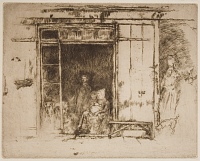Sleeping Child, Ajaccio | ||
| Number: | 488 | |
| Date: | 1901 | |
| Medium: | etching | |
| Size: | 153 x 190 mm | |
| Signed: | butterfly at upper left | |
| Inscribed: | no | |
| Set/Publication: | no | |
| No. of States: | 1 | |
| Known impressions: | 18 | |
| Catalogues: | K.-; M.-; T.-; W.- | |
| Impressions taken from this plate (18) | ||

Recto, above; verso, below:

The copper plates used by Whistler in Corsica came from two sources, C. Servant in Paris or Hughes and Kimber in London. This is one of two large copper plates bought from Servant that have survived from the Corsican trip (with Flaming Forge [490]).
The Pennells recorded Whistler's activities in Corsica:
'when the weather gave him a chance, he worked on his copperplates. J. [Joseph Pennell (1860-1926)] had grounded them at the last moment in the damp cold of London, they were packed in among his linen, and taken out in the hot sun of Ajaccio. The result was that the varnish came off in the biting - “All my dainty work lost” he said - and it looked as if the great shadow had fallen upon our friendship. But he knew the fault was his, and the shadow passed as quickly as it had come.' 3
3: Pennell 1908, vol. 2, pp. 265-266.
Whistler did attempt to rescue some of his work while still in Corsica, writing to his sister-in-law:
'This morning I wired you to post me a couple of pieces of charcoal for the scrubbing down of plates ... there are 3 or 4 stubby fat bits on the shelves behind the stove - I dont know that I can save anything with them.' 4
4: Whistler to R. B. Philip, [20 March 1901], GUW #04799.
It is quite possible that this was among the plates that Whistler thought had been spoilt, but that in fact it could be, and was, restored, possibly after Whistler's death in 1903.
The copper plate was in Whistler's studio at his death and was bequeathed to Rosalind Birnie Philip (1873-1958). The plate was printed by Nathaniel Sparks (1880-1956) in London after Whistler's death. It was then cancelled with a diagonal line at left. Miss Birnie Philip gave it to the University of Glasgow in 1935.
